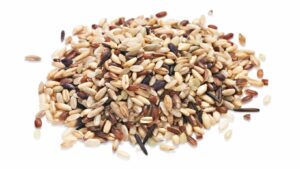 When it comes to crafting the perfect brew, selecting the right brewing grain is a crucial step that can make all the difference in the final product. Brewing grains are the foundation of any beer, providing the essential sugars that yeast will ferment into alcohol. From the rich malty flavors of barley to the unique characteristics of wheat and rye, each brewing grain brings its own distinctive profile to the brewing process. Exploring the world of essential brewing grains opens up a realm of possibilities for brewers looking to experiment with different flavors and textures in their creations. Whether you’re aiming for a crisp and refreshing lager or a robust and complex stout, understanding the role of brewing grains is key to achieving the desired outcome in your homebrewing endeavors.
When it comes to crafting the perfect brew, selecting the right brewing grain is a crucial step that can make all the difference in the final product. Brewing grains are the foundation of any beer, providing the essential sugars that yeast will ferment into alcohol. From the rich malty flavors of barley to the unique characteristics of wheat and rye, each brewing grain brings its own distinctive profile to the brewing process. Exploring the world of essential brewing grains opens up a realm of possibilities for brewers looking to experiment with different flavors and textures in their creations. Whether you’re aiming for a crisp and refreshing lager or a robust and complex stout, understanding the role of brewing grains is key to achieving the desired outcome in your homebrewing endeavors.
Essential Brewing Grain
 In the realm of brewing, selecting the right brewing grains is crucial as these grains act as the core of the beer-making process. They provide the necessary sugars that undergo fermentation to create the final product. Various grains like barley, wheat, and rye each bring distinct flavors and characteristics to different beer styles. Exploring a variety of grains can enrich the brewing experience and help brewers achieve specific flavor profiles, elevating the overall quality of the beer. Each grain brings unique flavors and characteristics to the final product, influencing everything from taste to texture. Barley, wheat, and rye offer distinct qualities that can elevate different beer styles.
In the realm of brewing, selecting the right brewing grains is crucial as these grains act as the core of the beer-making process. They provide the necessary sugars that undergo fermentation to create the final product. Various grains like barley, wheat, and rye each bring distinct flavors and characteristics to different beer styles. Exploring a variety of grains can enrich the brewing experience and help brewers achieve specific flavor profiles, elevating the overall quality of the beer. Each grain brings unique flavors and characteristics to the final product, influencing everything from taste to texture. Barley, wheat, and rye offer distinct qualities that can elevate different beer styles.
Types of Essential Brewing Grain
 Barley: Barley is one of the most commonly used brewing grains due to its high enzyme content necessary for the mashing process. It provides fermentable sugars and imparts a malty sweetness to the beer, making it a versatile grain suitable for various beer styles.
Barley: Barley is one of the most commonly used brewing grains due to its high enzyme content necessary for the mashing process. It provides fermentable sugars and imparts a malty sweetness to the beer, making it a versatile grain suitable for various beer styles.
Wheat: Wheat is known for its contribution to head retention and body in beer. It adds a smooth, creamy texture to the brew and is often used in wheat beers, Hefeweizens, and other light beer styles. Brewers appreciate wheat for its unique characteristics in enhancing mouthfeel.
Rye: Rye offers a spicy and earthy flavor profile to beer, making it a popular choice for adding complexity to brews like Roggenbier and Rye IPAs. It also provides a dry finish and a slightly tart taste, diversifying the range of flavors that can be achieved in craft beer production.
Factors to Consider When Choosing Essential Brewing Grain
In selecting essential brewing grain, brewers must consider various factors to ensure the quality and characteristics of the final beer product. Here are key considerations to keep in mind:
- Flavor Profile: Different grains offer distinct flavors to beer. Barley provides a malty sweetness, wheat contributes to a smooth texture and head retention, while rye adds spiciness and earthiness. Brewers should choose grains that align with the desired flavor profile of the beer they intend to brew.
- Enzyme Content: Barley is known for its high enzyme content, which plays a crucial role in the mashing process by converting starches into fermentable sugars. When selecting grains, brewers should consider the enzymatic capabilities of each grain to ensure proper sugar extraction during brewing.
By considering these factors when choosing essential brewing grain, brewers can craft beers with unique flavors, textures, and characteristics that elevate the overall quality of their brews.
Tips for Using Essential Brewing Grain
Selecting the right brewing grains is a crucial step in the beer-making process. Each grain brings unique flavors and characteristics to the final product, influencing everything from taste to texture. Barley, wheat, and rye offer distinct qualities that can elevate different beer styles. Barley’s high enzyme content aids in mashing, while wheat enhances head retention and adds a smooth texture. Rye, on the other hand, introduces a spicy and earthy flavor profile. Consider key factors like flavor profile, enzyme content, and compatibility with specific beer styles when choosing brewing grains. These elements play a significant role in shaping the overall quality and characteristics of the beer.

